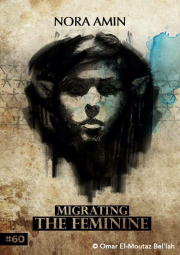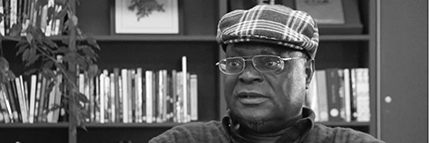 In her second post, dance artist and IRC-Fellow Johanna Devi reports from her first weeks at the Center and explains how a photo of a forrest can say it all.
In her second post, dance artist and IRC-Fellow Johanna Devi reports from her first weeks at the Center and explains how a photo of a forrest can say it all. 

 In this interview, IRC-fellow Richard Gough, Artistic Director of the Center for Performance Research (CPR), Professor of Performance Research and editor, speaks about his central working interest and research project, “Devouring Theater: After Taste”, on food in performances and food as performing art. He explains the importance of the concept of “interweaving” for his work and the impact of his fellowship on his research.
In this interview, IRC-fellow Richard Gough, Artistic Director of the Center for Performance Research (CPR), Professor of Performance Research and editor, speaks about his central working interest and research project, “Devouring Theater: After Taste”, on food in performances and food as performing art. He explains the importance of the concept of “interweaving” for his work and the impact of his fellowship on his research. 
 In this interview, IRC-Fellow Nora Amin, a writer, performer, choreographer, theater director and educator from Egypt, discusses her reasons for creating "La Musica Independent Theatre Group." After the short overview of her theater experience, the interview focuses on her switch in interest from a more traditional theater to street theater and theater as a clear form of activism. In this context, she talks about her involvement with the first production of An Enemy of the People in Arabic language and her research project on her experience in producing a play during politically turbulent times. Her research focuses on the intersection between the culture of performance and the culture of protest.
In this interview, IRC-Fellow Nora Amin, a writer, performer, choreographer, theater director and educator from Egypt, discusses her reasons for creating "La Musica Independent Theatre Group." After the short overview of her theater experience, the interview focuses on her switch in interest from a more traditional theater to street theater and theater as a clear form of activism. In this context, she talks about her involvement with the first production of An Enemy of the People in Arabic language and her research project on her experience in producing a play during politically turbulent times. Her research focuses on the intersection between the culture of performance and the culture of protest. 
 In this interview, IRC-Fellow Narges Hashempour, Iranian scholar, actress, director, writer, curator and dramaturge, talks about her connection to German theater and her first works as a director in Germany, introducing her comprehensive theater project Unwritten Whisper. She speaks about the role of women artists in Iran and the issues of gender in her own work. Explaining her motivation to expand her artistic work by a more academic dimension, she discusses the themes of her ph.d.-thesis on Iranian theater culture and gender performance. Pointing out the challenges caused by the mixing of her academic and her artistic work and by her cultural background, Narges Hashempour gives a thoughtful and differentiated insight into Iranian culture characterizing it as living "in-betweenness".
In this interview, IRC-Fellow Narges Hashempour, Iranian scholar, actress, director, writer, curator and dramaturge, talks about her connection to German theater and her first works as a director in Germany, introducing her comprehensive theater project Unwritten Whisper. She speaks about the role of women artists in Iran and the issues of gender in her own work. Explaining her motivation to expand her artistic work by a more academic dimension, she discusses the themes of her ph.d.-thesis on Iranian theater culture and gender performance. Pointing out the challenges caused by the mixing of her academic and her artistic work and by her cultural background, Narges Hashempour gives a thoughtful and differentiated insight into Iranian culture characterizing it as living "in-betweenness". 
 "The main loss in this situation is a loss of human communication and of identity. A loss of human behavior."
"The main loss in this situation is a loss of human communication and of identity. A loss of human behavior."
 In this interview, IRC-Fellow Cody Poulton, Professor of Japanese literature and theater in the Department of Pacific and Asian Studies at the University of Victoria, Canada, talks about his interests in and current research on drama and theater in Japan. After giving a short overview on the development of his research in the past twenty years, Poulton describes the scope and aims of his current research project in Berlin, which investigates how humanity’s place in the world is conceived of and represented in contemporary theater and performance in Japan.
In this interview, IRC-Fellow Cody Poulton, Professor of Japanese literature and theater in the Department of Pacific and Asian Studies at the University of Victoria, Canada, talks about his interests in and current research on drama and theater in Japan. After giving a short overview on the development of his research in the past twenty years, Poulton describes the scope and aims of his current research project in Berlin, which investigates how humanity’s place in the world is conceived of and represented in contemporary theater and performance in Japan. 
 In this interview, Shen Lin, the Chinese Professor for Theater Studies, Deputy Head of Research at the Central Academy of Drama in Beijing, Chief Editor of The Drama Journal, writer and translator, is introducing his research project "The Formal and the Political in Modern and Contemporary Chinese Performances.“ Shen Lin speaks about the dominant role of Shakespeare as a global theater figure, as well as – in a very personal manner – about his own project’s connection to the Center’s fields of research. En passent, he gives important insights into his work as a cultural consultant for China’s leading performance organizations. Surprisingly clearly, he finally discusses the question of how "political" theater can be in China...
In this interview, Shen Lin, the Chinese Professor for Theater Studies, Deputy Head of Research at the Central Academy of Drama in Beijing, Chief Editor of The Drama Journal, writer and translator, is introducing his research project "The Formal and the Political in Modern and Contemporary Chinese Performances.“ Shen Lin speaks about the dominant role of Shakespeare as a global theater figure, as well as – in a very personal manner – about his own project’s connection to the Center’s fields of research. En passent, he gives important insights into his work as a cultural consultant for China’s leading performance organizations. Surprisingly clearly, he finally discusses the question of how "political" theater can be in China... 
 In this interview, the dramatist, researcher, and theatre director Femi Osofisan, a fellow at the center since 2012, explains how colonialism shaped his conception of ‘theatre’ during his childhood and how he became aware of the political, ethical, and moral dimensions of performance and theatre while studying in France in the 1970s. Osofisan also shares his rich experience as a political dramatist and theatre director who has been working around the globe for more than 30 years, practicing ‘interweaving’ as an aesthetic strategy for addressing current social and political problems in Nigeria and many other places where he has staged his fascinating work—including the U.S., the U.K., China, and Germany.
In this interview, the dramatist, researcher, and theatre director Femi Osofisan, a fellow at the center since 2012, explains how colonialism shaped his conception of ‘theatre’ during his childhood and how he became aware of the political, ethical, and moral dimensions of performance and theatre while studying in France in the 1970s. Osofisan also shares his rich experience as a political dramatist and theatre director who has been working around the globe for more than 30 years, practicing ‘interweaving’ as an aesthetic strategy for addressing current social and political problems in Nigeria and many other places where he has staged his fascinating work—including the U.S., the U.K., China, and Germany. 